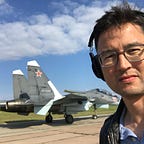Russia’s Highlanders Explained
“If a Russian gets offended, he starts drinking. Here a person takes up arms.”
Everyone who wants to understand Russia’s volatile North Caucasus region goes to Zaur Gaziyev. Reporters, human rights activists, and even the Kremlin have consulted the charming, witty 40-something journalist. His ties to one of Dagestan’s most powerful political families haven’t stopped him from criticizing the provincial government — and getting attacked by hired thugs as a result.
At first, Gaziyev is reluctant to meet with me. To him, I’m just another foreign correspondent passing through Makhachkala with the same old questions. For all he knows, I could be a CIA agent, Gaziyev jokes as he welcomes me into the spacious 10th-floor apartment where he lives with his family and a private gallery of paintings by local artists. It doesn’t take long before Caucasian hospitality sweeps aside Cold War suspicions.
Photo: Lucian Kim
I posit that the North Caucasus — distinct from the rest of the country by religion, culture, and tradition — presents the biggest challenge to Russia’s unity in its current borders.
If Russians largely supported the Kremlin’s bloody campaigns to crush Chechen independence in the past, today they are fed up with subsidizing the North Caucasus and receiving an exodus of migrants from the impoverished region. Terrorist attacks traced back to Islamists hiding in the backwoods of the North Caucasus have only added to the resentment.
Gaziyev reduces the uneasy relationship with the Russian majority to clashing worldviews.
“We may share a common language with Russians, but our ethno-psychology is different — even from those Russians who live here,” says Gaziyev. “We’ve been here for 1,000 years. It’s probably genetic.”
“We may share a common language with Russians, but our ethno-psychology is different. It’s probably genetic.”
What Gaziyev means is the highlander’s code of honor and fierce independence.
“The free spirit lives on in the people. We didn’t have 600 years of serfdom like Russia did.
“If a Russian gets offended, he’ll start drinking,” Gaziyev says. “Here a person will take up arms and make the offending party’s life hell.”
There are also differences in traditional family structure, he says. Up in the hardscrabble mountains, men and women were seen as equals, even if they had different roles. Women did the farming; men went on raids into neighboring Georgia, Azerbaijan, and Persia.
“The thing Dagestanis do best of all is fight,” says Gaziyev. “Look at the Olympic disciplines we excel at: wrestling and boxing. We’re bad at team sports.
Photo: wrestdag.ru
“Every village was a fortress. The world wasn’t divided into ‘good against evil,’ but ‘us against them.’ I don’t believe this is right, but this is the way it’s been.”
Contact with the Russian Empire began chipping away at traditional ways of life. After the communist revolution, resettlement from the mountains to the plains accelerated.
Even today, a highlander who moves to Makhachkala inevitably loses his orientation.
Gaziyev himself belongs to the Dargins, the second largest of Dagestan’s dozen ethnic groups. He confesses that he doesn’t know the Dargin language; he speaks, thinks, and writes in Russian.
Since the collapse of communism 20 years ago, a new generation has come of age in the North Caucasus without Soviet, i.e. Russian, socialization. Islam — often militant Islam — has replaced communist ideology, and regional pride has substituted the sense of belonging to a great superpower.
Photo: Lucian Kim
The most disaffected youth have taken to the hills to fight for an Islamic caliphate that would stretch across the North Caucasus from the Black to Caspian Seas.
“As long as large sums of money go to fighting terrorism, there will be terrorism,” Gaziyev says. His words can be interpreted globally, but he is referring specifically to the North Caucasus.
With so much money committed to the war on terror, too many entrenched interest groups are benefiting from the Kremlin’s largesse for the fight to ever end.
“As long as large sums of money go to fighting terrorism, there will be terrorism.”
In Gaziyev’s opinion, Dagestan must stay a part of Russia if it is to remain in Europe and not go the way of Afghanistan.
I ask him how he views the future.
“The situation is so incomprehensible that it’s impossible to make a prediction. Too many forces are pulling in different directions,” Gaziyev says.
“We’ve lost our bearings of what’s good and bad. Anything could happen.”
